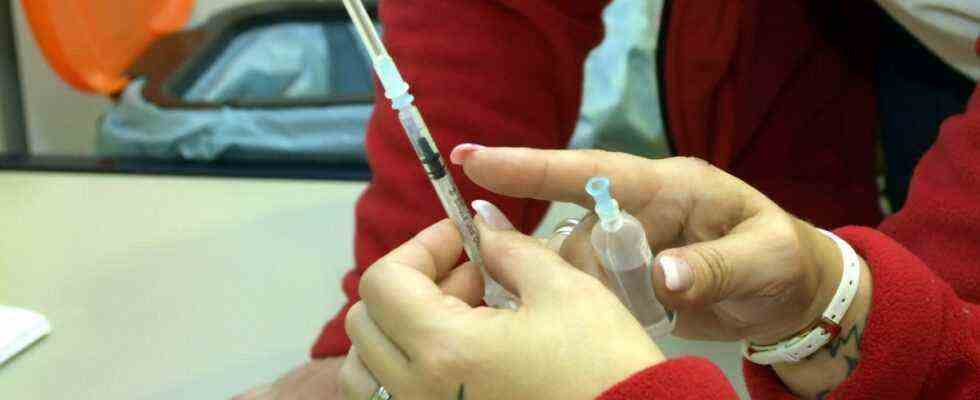While the Bundestag has started advising on a legal vaccination requirement, the willingness for corona vaccinations in the Erding district is rapidly declining. According to data from the Robert Koch Institute (RKI), a year after the start of the vaccination campaign, only a few adults decide to have basic immunization. On the one hand, this is logical because the majority of people have long since been vaccinated. On the other hand, however, it is just as logically clear that the vaccination rate will only improve in very small steps. January is not over yet. But it is foreseeable that it will be the month with the lowest number of first vaccinations since the start of the vaccination campaign.
The district office in Erding states that the rate of fully vaccinated people is 68.8 percent according to its own count. The RKI has also been keeping records since the beginning of the vaccination campaign and – for whatever reason – has slightly different, lower numbers, from which a vaccination rate of 62.8 percent of the fully vaccinated is calculated. According to the daily report from the district office on Wednesday, 414 new corona infections were registered in the district within 24 hours. The seven-day incidence in the Erding district was 1360.8 on Wednesday and has therefore fallen slightly compared to Tuesday. Twelve Covid 19 patients were treated in the Erding Clinic on Wednesday, only one of them in the intensive care unit, which had to be ventilated.
A lot has been vaccinated lately, but the vast majority of vaccinations were booster vaccinations. In between, the demand was so great that the vaccination center of the Bavarian Red Cross (BRK) could only make appointments with weeks of waiting and many medical practices were fully booked. To ensure that there was enough vaccine for the mobile BRK vaccination teams, the vaccination bus and all kinds of special vaccination campaigns, the allocation of vaccines to resident doctors was restricted.
Now things look completely different: There are no longer any queues for the mobile BRK vaccination campaigns, appointments can be made promptly again in the vaccination center and also in the doctor’s offices. On Tuesday, for example, a mobile vaccination team from the BRK was in the gym in Hohenpolding all day. Only 16 people came. On Friday in Dorfen there were only 43 people willing to be vaccinated in six hours, and the day before just 24 people took the opportunity when the vaccination bus stopped at the Grüner Markt in Erding during the weekly market. According to BRK spokeswoman Danuta Pfanzelt, special vaccination campaigns work best, such as last Thursday in a larger company or on Friday evening in the “Wintergarten” in Erding, where 84 and 57 people respectively had an injection. The BRK vaccination center vaccinates about 170 people every day.
The doctors in private practice receive significantly more vaccine again, because there is not so much going on otherwise. Most recently, the “maximum allocation” was capped at 30 vaccine doses per doctor. Last Thursday, the National Association of Statutory Health Insurance Physicians reported that twice as much could be ordered for the first week of February. Markus Marschall, the district chairman of the Association of Statutory Health Insurance Physicians, shakes his head after weeks of shortages: “At the moment we would get more than there is demand.”
The RKI gives the new numbers for first, second or booster vaccinations in four age groups for every city and every district in Germany every working day: for the over-60s, for adults from 18 to 59 years, for young people between twelve and 17 years of age and for a few weeks now also for children from five to eleven years of age. The statistics therefore allow a differentiated view of how the vaccination campaign is developing.
Since older people were initially given priority for a corona vaccination last year, 93.3 percent of the vaccinated over-60s in the Erding district had already received their basic immunization by the end of June. All those who came after were latecomers. Even the dramatic fourth wave of the pandemic in November and December only gave a small boost to the previously undecided, unvaccinated older people. At 76, the number of first vaccinations over 60 in January in the district of Erding has now fallen to an absolutely marginal level.
In the significantly larger group of adults between 18 and 59 years of age, the situation is similar – with a time lag. By the end of October, 92.8 percent of those vaccinated had at least had their first vaccination. In the fourth wave there was also only a tiny intermediate high. This January, the number of first-time vaccinations among 18- to 59-year-olds slipped to a new low. So far there were 558, which brings the vaccination rate in the district of Erding by just 0.4 percentage points.

